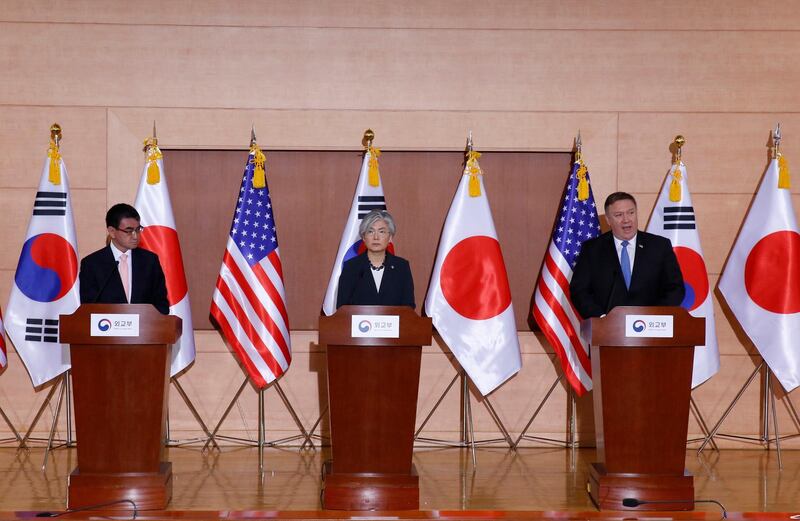North Korea's Kim Jong Un understands that denuclearisation must happen "quickly", US Secretary of State Mike Pompeo said on Thursday, warning there will be no sanctions relief for Pyongyang until the process is complete.
Mr Pompeo said Washington remained committed to the "complete, verifiable and irreversible" denuclearisation of North Korea, after the joint statement from the US-North Korea summit in Singapore drew criticism for lack of detail on the key issue.
"We believe that Kim Jong-un understands the urgency... that we must do this quickly," he said of the effort to have North Korea abandon its nuclear weapons.
_________
Read more:
Pompeo moves to reassure allies as glow from Singapore summit fades
Tokyo concerned over Trump cancellation of war games
_________
Washington's top diplomat was in Seoul to brief his South Korean and Japanese counterparts on Tuesday's historic talks - the first between sitting leaders of the US and North Korea - after which a triumphant President Donald Trump said the world can "sleep well".
Following the summit, Mr Trump said the US would halt its "provocative" joint military drills with South Korea as long as negotiations are ongoing with the North, an announcement that caught Seoul by surprise.
Mr Pompeo insisted at a joint press conference with the South Korean and Japanese foreign ministers that there were no differences among the allies on how to achieve the denuclearisation of North Korea.
Contrasting the Trump policy with previous US administrations, Mr Pompeo said: "In the past, they were providing economic and financial relief before ... complete denuclearisation had taken place."
"That is not going to happen, President Trump made that clear."
Mr Pompeo's comments came after North Korean state media reported on Wednesday that Mr Trump had not only offered to stop military exercises during dialogue, but also lift sanctions imposed on Pyongyang.
The US and South Korea conduct several large drills every year to maintain readiness for operations on the peninsula, a source of irritation for Pyongyang, which considers them preparations for an invasion.
South Korean Foreign Minister Kang Kyung-who appeared to sidestep the issue at the joint press conference, saying the matter would be left to military authorities to discuss, and that the US-South Korea alliance remained "as robust as ever".
Earlier, South Korean President Moon Jae-in acknowledged that "there may be very conflicting views" about the summit, but it had still helped mitigate fears of a nuclear war.
"In this way I believe it was very successful."
He later said Seoul would carefully consider the future of the drills "if North Korea faithfully implements denuclearisation measures and sincere dialogue continues", according to his office.
While it is not directly involved, Japan also considers the exercises vital.
The "deterrence based on them [plays] an essential role for security in north-east Asia", Japanese Foreign Minister Taro Kono said after the "frank" trilateral talks on Thursday.
Mr Kono said Japan understood the pause in the drills to be contingent on North Korean steps towards denuclearisation, adding that "no security guarantees have been given yet".
Mr Pompeo said the suspension of the exercises depended on productive negotiations in "good faith".
Mr Trump had raised eyebrows Tuesday by describing his own country's drills on the Korean peninsula as "provocative", a term used by the North for the exercises.
Pyongyang describes its nuclear weapons and long-range missiles as a shield against US aggression, and has in the past linked denuclearisation to the removal of US forces from the peninsula.
Mr Pompeo later left Seoul for China, arriving late afternoon local time in Beijing where he is scheduled to meet President Xi Jinping and Foreign Minister Wang Yi.
Despite some concerns among allies and analysts, the Trump administration continues to tout the summit as a success, and Mr Pompeo said earlier that he hoped to see "major disarmament" of North Korea by 2020.
A bullish Mr Trump declared after the summit that the nuclear threat from North Korea no longer existed, and tweeted on Wednesday that people "can now feel much safer than the day I took office" and can "sleep well tonight!"
The US leader also defended his decision on the military drills with South Korea: "We save a fortune by not doing war games, as long as we are negotiating in good faith — which both sides are!"
The president's latest comments are in stark contrast to his threats to unleash "fire and fury" last year in response to Pyongyang's nuclear and long-range missile tests. The North retaliated by boasting it could annihilate the United States.
After months of tensions which saw Mr Trump and Mr Kim trade personal insults, whirlwind diplomatic efforts were launched earlier this year, catalysed by the Winter Olympics in South Korea.
The remarkable de-escalation saw Mr Kim reach out to Mr Trump, conduct a historic summit with Mr Moon, and visit Mr Xi in Beijing - his first trip abroad as leader.
In the latest step to ease cross-border tensions, the two Koreas held their highest-level military talks in over a decade on Thursday at the truce village of Panmunjom in the Demilitarised Zone that divides the two countries.
The reclusive regime in Pyongyang has long craved international legitimacy, and has played up the summit as a major victory for Mr Kim, with state media calling it the "meeting of the century".





